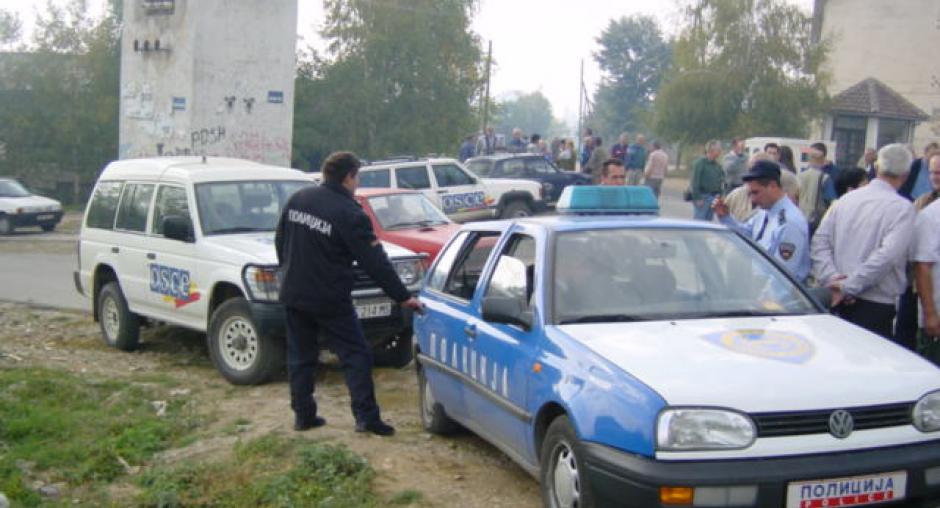Newsroom
OSCE monitors accompany redeployment of Macedonian multi-ethnic police
SKOPJE 20 December 2001

The OSCE is monitoring the redeployment of Macedonian police in former conflict areas. (Harald Schenker/OSCE) Photo details
SKOPJE, 20 December 2001 - Ethnically mixed police teams, accompanied by monitors of the OSCE and the European Union, yesterday redeployed to another five villages located in the previous conflict area around the town of Tetovo, in the former Yugoslav Republic of Macedonia. Representatives of NATO's Task Force Fox were also present.
The redeployment of police forces is now progressing smoothly in all 15 villages planned for the initial phase of the comprehensive re-entry plan, designed by the Macedonian Government and supported by the international community. Consultations are under way regarding the group of 10 to 15 villages to be included in the next stage of redeployment.
"The successful implementation of the redeployment plan is a result of the great support and understanding for this country offered by the missions of the OSCE and NATO", said General Aleksandar Donchev, Head of the Macedonian Crisis Management Centre. The Centre is a technical body established by the Macedonian Government to co-ordinate the redeployment plan. A further five villages, included in the pilot project phase of the plan, are also being patrolled by multi-ethnic police.
The redeployment plan is a crucial component of the peace process envisaged by the Ohrid Agreement of 13 August 2001. The OSCE Spillover Monitor Mission to Skopje is currently providing support for this process through the presence of 107 confidence-building monitors and 60 police advisors.
"Good, accurate and timely information is crucial for successful confidence-building", said Craig Jenness, the Head of the OSCE Mission to Skopje. "Thanks to good co-operation with the authorities, local leaders and other international organizations, we have succeeded in taking the first important step towards rebuilding confidence within the local communities and trust in their police", he added.
The warm welcome received by the police in the last couple of days has enhanced the peaceful atmosphere reigning in the ten villages where redeployment started last week. Villagers approached and greeted police patrols, while some community leaders are already looking for appropriate locations to host police contact desks. The local population has voiced hope and expectation that key provisions of the redeployment plan, such as the phased reduction of checkpoints, will be observed and implemented.
As the start of the redeployment generated an increased sense of safety and security, people moved freely to visit relatives and friends over the weekend. Many ethnic Albanians from the municipalities of Kumanovo and Lipkovo got together to celebrate Bajram, a local festivity marking the end of Ramadan. "It was touching to see families getting back together after nine months. It almost broke my heart", said Dan Predatu, the OSCE Team Leader in Kumanovo.
The return of the police forces to former conflict areas was facilitated by an intensive information campaign. The Macedonian Government prepared flyers and other printed material that was distributed by OSCE and European Union monitors.
The redeployment of police forces is now progressing smoothly in all 15 villages planned for the initial phase of the comprehensive re-entry plan, designed by the Macedonian Government and supported by the international community. Consultations are under way regarding the group of 10 to 15 villages to be included in the next stage of redeployment.
"The successful implementation of the redeployment plan is a result of the great support and understanding for this country offered by the missions of the OSCE and NATO", said General Aleksandar Donchev, Head of the Macedonian Crisis Management Centre. The Centre is a technical body established by the Macedonian Government to co-ordinate the redeployment plan. A further five villages, included in the pilot project phase of the plan, are also being patrolled by multi-ethnic police.
The redeployment plan is a crucial component of the peace process envisaged by the Ohrid Agreement of 13 August 2001. The OSCE Spillover Monitor Mission to Skopje is currently providing support for this process through the presence of 107 confidence-building monitors and 60 police advisors.
"Good, accurate and timely information is crucial for successful confidence-building", said Craig Jenness, the Head of the OSCE Mission to Skopje. "Thanks to good co-operation with the authorities, local leaders and other international organizations, we have succeeded in taking the first important step towards rebuilding confidence within the local communities and trust in their police", he added.
The warm welcome received by the police in the last couple of days has enhanced the peaceful atmosphere reigning in the ten villages where redeployment started last week. Villagers approached and greeted police patrols, while some community leaders are already looking for appropriate locations to host police contact desks. The local population has voiced hope and expectation that key provisions of the redeployment plan, such as the phased reduction of checkpoints, will be observed and implemented.
As the start of the redeployment generated an increased sense of safety and security, people moved freely to visit relatives and friends over the weekend. Many ethnic Albanians from the municipalities of Kumanovo and Lipkovo got together to celebrate Bajram, a local festivity marking the end of Ramadan. "It was touching to see families getting back together after nine months. It almost broke my heart", said Dan Predatu, the OSCE Team Leader in Kumanovo.
The return of the police forces to former conflict areas was facilitated by an intensive information campaign. The Macedonian Government prepared flyers and other printed material that was distributed by OSCE and European Union monitors.
